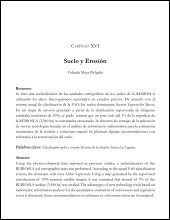Mitigación del efecto de sales clorhídricas y sulfáticas en la germinación de Salicornia bigelovii (Torr.) por bacterias benéficas in vitro
Mitigating the effect of chloride salts and sulfáticas germination of Salicornia bigelovii (Torr.) by beneficial bacteria in vitro
Author
MARIA MAGDALENA HERNANDEZ PERALES
RODOLFO CISNEROS ALMAZÁN
JESUS ORTEGA GARCIA
CANDIDO MARQUEZ HERNANDEZ
BERNARDO MURILLO AMADOR
LUIS GUILLERMO HERNANDEZ MONTIEL
ALEJANDRA NIETO GARIBAY
EDGAR OMAR RUEDA PUENTE
Metadata
Show full item recordAbstract
"En México 30% de su superficie agrícola está afectada por la salinidad. Lo anterior expuesto repercute para que una agricultura convencional a base de glicófitas, no sea redituable y productiva. Con el interés de ampliar el conocimiento con halófitas de interés agroindustrial y poder proponerlas al sector productivo que presenta problemas de sales, se desarrolló el presente estudio bajo condiciones de salinidad clorhídrica y sulfática inducida, evaluando dos genotipos de Salicornia bigelovii en las etapas de germinación y desarrollo (genotipo mejorado SOS-7 y genotipo silvestre Bahía de Kino= BK=), desarrollándola en condiciones de salinidad: dos de cloruro de sodio (NaCl) a 0.5 molar y a 1 molar y dos de sulfato de calcio (Ca2SO4+2H2O) a 0.5 Molar y a 1 Molar, con la inoculación de dos bacterias promotoras del crecimiento vegetal (BPCV) (Azospirillum halopraeferens= Ah y Klebsiella pneumoniae= Kp) y un control sin inocular. Los resultados indican que al evaluar a Salicornia en condiciones salinas clorhídricas y sulfáticas con la inoculación de BPCV, entre los resultados obtenidos figuran que un porcentaje mayor de germinación fue observado en presencia de las BPCV, sobresaliendo aquellos inoculados con Kp. Se observó, que conforme la salinidad incrementa, Kp presenta tener mayor efectividad con el genotipo silvestre BK. Estudios concernientes como posibles biofertilizantes son necesarios en las diferentes etapas fenológicas con los genotipos en estudio, quienes para la etapa de germinación, resultaron tener expectativas." "In Mexico 30% of its agricultural land is affected by salinity. This affects exposed to conventional agriculture based glycophyte not be profitable and productive. In the interest of expanding knowledge with halophytes of agroindustrial interest and to propose them to the productive sector presents problems of salts, this study under conditions of hydrochloric salinity and induced sulfate developed, evaluated two genotypes of Salicornia bigelovii in the stages of germination and development (improved genotype SOS-7 and wild genotype Bay Kino= BK=), developing in salinity conditions: two sodium chloride (NaCl) at 0.5 molar and 1 molar and two calcium sulfate (Ca2SO4+2H2O) to 0.5 Molar and 1 Molar, with inoculation of two plant growth promoting bacteria (PGPR) (Azospirillum halopraeferens= Ah and Klebsiella pneumoniae= Kp) and an uninoculated control. The results indicate that when evaluating Salicornia in saline conditions sulfate and hydrochloric inoculation with BPCV, including the results include a greater percentage of germination was observed in the presence of BPCV, excelling those inoculated with Kp. It was observed that as the salinity increases, Kp presents be more effective with wild genotype BK. Studies concerning as possible bio-fertilizers are needed in different phenological stages with genotypes studied, who for the germination stage, turned out to have expectations."
Collections
Related items
Showing items related by title, author, creator and subject.
-
PROMOCIÓN DEL PERIFITON PARA EL CULTIVO DE CAMARÓN BLANCO: HACIA UNA ACUICULTURA ECOLÓGICA
DOMENICO VOLTOLINA LOBINA; JUAN MANUEL AUDELO NARANJO; MARIA DEL ROSARIO PACHECO MARGES -
Suelo y Erosión
YOLANDA LOURDES MAYA DELGADO


